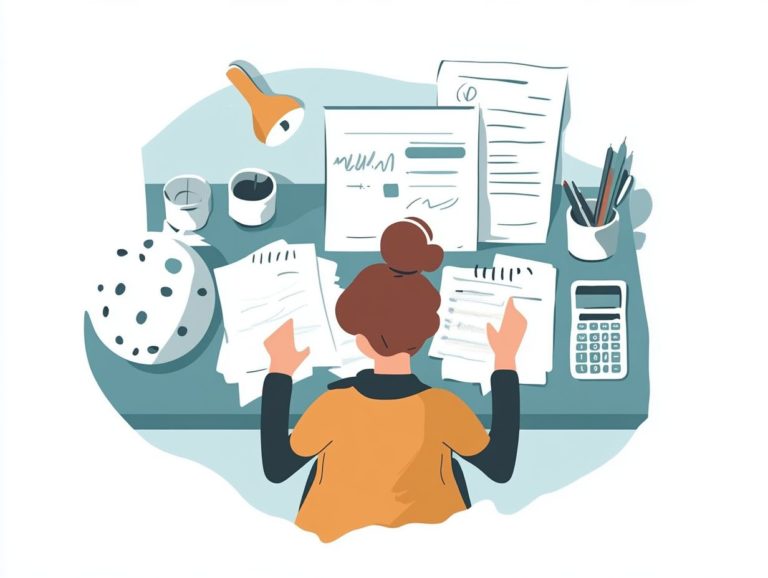How to Use Budgeting to Get Out of Debt
Managing debt can seem daunting, but recognizing its impact on your finances is the crucial first step toward regaining control.
This guide will walk you through the essentials of budgeting. You ll discover how to assess your income and expenses, set realistic goals, and craft a robust debt repayment plan.
You’ll also find valuable tips to maintain your budget and strategies to prevent slipping back into debt. Are you ready to take charge of your finances? Let s dive in!
Contents
- Key Takeaways:
- Understanding Debt and Budgeting
- Creating a Budget
- Implementing a Debt Repayment Plan
- Maintaining Your Budget and Staying Debt-Free
- Frequently Asked Questions
- How can budgeting help me get out of debt?
- Do I need to stick to a strict budget to get out of debt?
- What are some budgeting strategies for getting out of debt?
- Should I cut back on expenses or increase my income to get out of debt?
- Can I use budgeting to pay off all types of debt?
- Is it advisable to seek professional help for budgeting and getting out of debt?
Key Takeaways:

- Learn how debt affects your finances and the importance of budgeting to manage it effectively.
- Create a budget by assessing your income and expenses, setting realistic goals, and prioritizing debt repayment.
- Implement a debt repayment plan by utilizing strategies and tackling high-interest debt to achieve financial stability.
Understanding Debt and Budgeting
Grasping the nuances of debt and budgeting is essential for anyone aspiring to attain financial stability and independence. Debt manifests in various forms credit card balances, student loans, personal loans and each can profoundly influence your overall financial landscape.
By establishing a well-organized budget, you can monitor your expenses and prioritize your needs. This strategic approach sets the stage for a healthier financial future and enables you to implement effective debt repayment strategies.
What is Debt and How Does it Affect Your Finances?
Debt is the sum of money you owe to creditors, and it can significantly impact your financial health and credit score.
Various types of debt, including credit card debt, personal loans, and student loans, differ in structure and consequences. For example, credit card debt often comes with steep interest rates. In contrast, student loans typically offer lower rates but can weigh heavily on graduates for years to come.
If you mismanage these obligations, you risk escalating interest payments and a damaged credit score, making it more challenging to secure future loans. As financial stress builds, you might find yourself trapped in a cycle of borrowing, leading to greater financial challenges.
The Importance of Budgeting in Managing Debt
Budgeting is absolutely essential for managing debt effectively. It offers you a clear view of your financial landscape and helps you prioritize your expenses.
By meticulously tracking your monthly expenses, you can spot spending patterns. This practice allows you to allocate a portion of your income towards debt repayment, minimizing interest and enabling you to pay off loans more swiftly.
Setting savings goals further reinforces your financial discipline, equipping you to handle unexpected expenses or make specific future purchases effortlessly.
There are various budgeting methods that can enhance your approach. For instance, zero-based budgeting means assigning a purpose to every dollar, while the 50/30/20 rule recommends a straightforward distribution of income towards needs, wants, and savings.
These techniques empower you to take control of your finances, paving the way toward lasting financial stability.
Creating a Budget
Creating a budget is an essential step toward embracing financial responsibility and achieving your financial aspirations. It enables you to systematically evaluate your income and expenses, providing clarity and direction on your journey to financial success.
Assessing Your Income and Expenses

Assessing your income and expenses is the crucial first step in budgeting. It helps you map out your financial landscape and pinpoint areas ripe for improvement.
By categorizing your income into fixed and variable, you gain a clearer understanding of your earnings and how to allocate your funds effectively. Fixed income refers to money you receive regularly, like salaries or rent. Variable income includes earnings that change from month to month, such as bonuses or freelance payments.
Delving into your finances can uncover spending habits to adjust for better savings. It s vital to spot pesky unnecessary expenses, like subscriptions or impulse purchases, that sneak into your daily life.
Consider actively tracking your monthly expenditures using budgeting templates or apps. This can illuminate your spending patterns and provide a clearer picture of your overall financial health.
Setting Realistic Goals and Priorities
Setting realistic financial goals and prioritizing your spending is crucial for successful budgeting and effective debt management.
By distinguishing between wants and needs, you enable yourself to make informed decisions that align with your long-term objectives. Establishing an emergency fund becomes vital, allowing you to handle unexpected expenses without resorting to high-interest debt.
This financial cushion not only brings peace of mind but also supports a healthy credit score.
Efficient resource allocation is key. Craft a detailed budget that encompasses both fixed and discretionary spending to pursue your goals with greater clarity and stability.
Implementing a Debt Repayment Plan
Implementing a debt repayment plan is crucial for achieving your financial freedom. By systematically reducing your debts through tailored strategies, you take control of your future and pave the way for a more secure and prosperous life.
Strategies for Paying off Debt
You have a variety of strategies for paying off debt, each tailored to fit different situations. This includes methods like snowball and avalanche for managing credit card and personal loans.
These approaches help you manage debt effectively and provide motivation by breaking larger sums into manageable goals. If you thrive on quick wins, the snowball method encourages you to tackle smaller debts first, generating a rush of momentum and a satisfying sense of accomplishment.
On the other hand, if you want to maximize savings in the long term, the avalanche method allows you to focus on high-interest debts, ultimately saving you more money.
Start by listing all your debts. Allocate a specific amount each month towards your chosen method while ensuring you continue to meet the minimum payments on your other debts.
For example, if you have multiple credit cards, apply the snowball method by paying off the card with the lowest balance first. Once that s cleared, redirect those funds to the next debt on your list, gradually propelling yourself toward financial freedom.
Dealing with High-Interest Debt
Dealing with high-interest debt is essential for maintaining a solid financial footing. This type of debt often comes from credit cards and payday loans, known for their sky-high interest rates that can trap you in a cycle of borrowing.
To tackle these challenges, consider options like debt consolidation, which means combining multiple debts into one easier payment, or refinancing for a better rate. These strategies can offer relief by merging debts into a single payment with a lower interest rate.
Establishing a rigorous budgeting strategy is crucial. It allows you to monitor your spending habits, prioritize debt repayment, and significantly reduce the likelihood of falling back into high-interest traps.
By taking these proactive steps, you can regain control over your financial landscape and pave the way for a more secure future. Start tackling your debt today!
Maintaining Your Budget and Staying Debt-Free

Maintaining your budget is crucial for achieving and preserving a debt-free lifestyle. It requires diligent tracking of your expenses and a steadfast commitment to your financial well-being.
Tips for Sticking to Your Budget
Sticking to your budget demands a blend of discipline and unwavering effort. Here are several practical tips to enhance your commitment to maintaining a strong financial position.
One effective strategy is to use budgeting apps that simplify tracking your expenses. These tools often have features that send alerts for overspending in different categories, helping you keep your financial goals in sight.
Involving family members in financial discussions promotes transparency and fosters a sense of shared responsibility. This approach can make it easier for everyone to adhere to the plan.
As your financial situation changes whether due to variations in income, unexpected expenses, or new goals adapt your budgeting strategies to stay aligned with your overall financial health.
How to Avoid Falling Back into Debt
To stay debt-free, actively manage your expenses and habits. Look for ways to save and explore options for additional income.
Developing strong strategies that support a debt-free lifestyle is essential. One effective method is establishing an emergency fund. This way, you can handle unexpected expenses without resorting to credit, giving you a financial cushion for any windfall or automatic payments.
Using cash for everyday purchases can help curb impulse buys, making it easier to stick to your budget. Understanding the role of budgeting in debt reduction can also enhance your financial strategy. Consider options like freelancing or a side hustle for extra money.
Ongoing financial education is your ally in making informed decisions. Stay updated on best practices regarding the Annual Percentage Rate (APR) on loans and various types of debt management. Regularly reevaluating your financial goals helps ensure they remain aligned with your changing circumstances and aspirations, enabling you to take control of your financial trajectory.
Frequently Asked Questions
How can budgeting help me get out of debt?
Budgeting helps you track your income and expenses. By identifying areas where you can cut spending, you can allocate more funds to pay off your debt.
Do I need to stick to a strict budget to get out of debt?

It’s important to have a budget that suits your financial situation. This might mean being strict or creating a more flexible budget. The key is to track your spending consistently and adjust as needed, especially when you receive a windfall or take on freelancing work.
What are some budgeting strategies for getting out of debt?
Effective strategies include the debt snowball method, where you pay off your smallest debts first, and the debt avalanche method, where you prioritize paying off debts with the highest interest rates. Consider consolidation loans for better management as well.
Should I cut back on expenses or increase my income to get out of debt?
A combination of both is ideal. If you can’t increase your income through a side hustle, focus on cutting unnecessary expenses in your budget.
Can I use budgeting to pay off all types of debt?
Yes, budgeting can be applied to any type of debt, including credit card debt, student loans, and mortgages. It is particularly useful when seeking credit counseling. By creating a budget, you can prioritize your debt payments and work towards becoming debt-free.
Is it advisable to seek professional help for budgeting and getting out of debt?
Are you having trouble creating a budget or managing your debt? Seeking help from a financial advisor or credit counselor can be very useful.
They offer tailored advice and can help you develop a plan to reduce your debt. Understanding annual percentage rates (APR) can also guide you in making better loan choices. These rates show how much interest you will pay each year on a loan.
Don’t let debt hold you back! Take the first step towards financial freedom today by consulting a professional.






